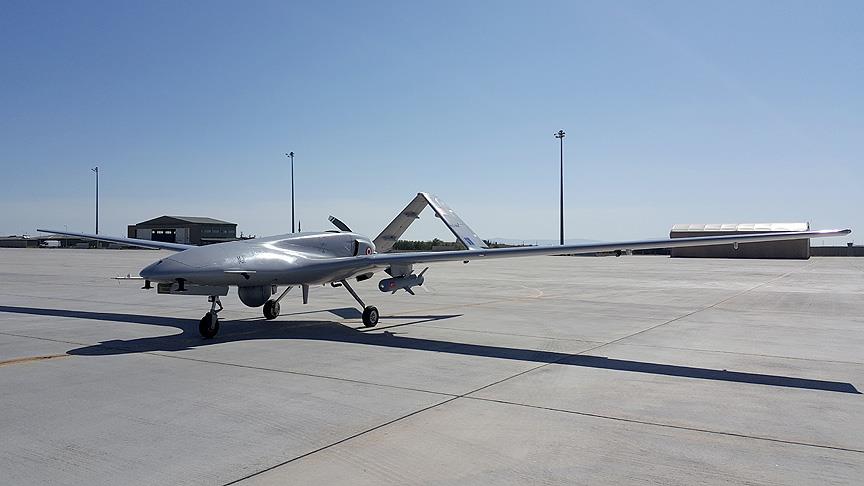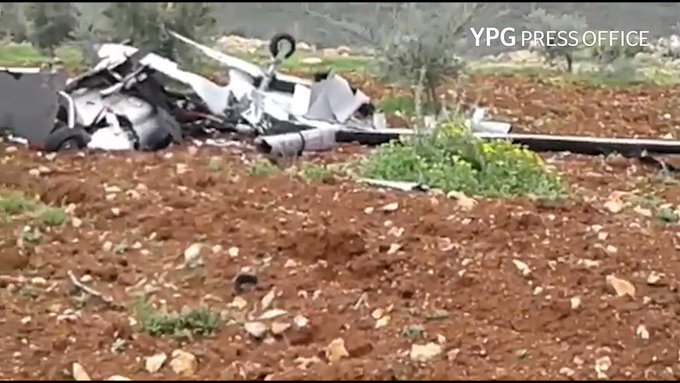Announcement
Collapse
No announcement yet.
Regional geopolitics
Collapse
X
-
-
Turkish Army suffers highest number of casualties in northern Syria on Saturday
By Leith Aboufadel
-
11/02/2018

Rate Article (5 / 2)
BEIRUT, LEBANON (12:55 A.M.) – The Turkish Army’s suffered their highest number of casualties in northern Syria on Saturday, as they continued their three week long offensive against the Kurdish-led People’s Protection Units (YPG).
According to the Turkish General Staff, at least eleven soldiers were killed during the Turkish Army’s operations in the Afrin region of northern Aleppo.
The eleven Turkish soldiers were killed while aiding their allies from the Euphrates Shield in the Rajou and Bulbul districts of Afrin, which are currently contested.
In a separate incident on Saturday, a Turkish military chopper was shot down by the YPG as it was finishing up a mission in the Afrin region.
As a result of this attack by the YPG in northern Afrin on Saturday, two Turkish military personnel were killed after their chopper crashed.
Comment
-
" Standoff on high seas: Turkish warships block Cypriot offshore drillingOriginally posted by Azad View Post"Turkey tells Greece it owns eastern Aegean shelf
Turkey is ready to take “all necessary measures” to protect the rights of Turkish Cypriots and Turkey’s ownership of the continental shelf in the eastern Aegean,
Cyprus has accused Turkey of obstructing a drilling rig from reaching an exploration area in the east Mediterranean. The Italian energy firm Eni was set to undertake exploratory drilling for natural gas.
The Saipem 12000 drill ship was en route to an area south-east of Cyprus when it was stopped by Turkish warships and told to go no further due to military activities in the destination area, according to a spokesman for Eni quoted by Reuters."
 Cyprus has accused Turkey of obstructing a drilling rig from reaching an exploration area in the east Mediterranean. The Italian energy firm Eni was set to undertake exploratory drilling for natural gas.
Cyprus has accused Turkey of obstructing a drilling rig from reaching an exploration area in the east Mediterranean. The Italian energy firm Eni was set to undertake exploratory drilling for natural gas.
Comment
-
-
"BRUSSELS (Reuters) - The European Union’s executive on Monday called on Turkey to “refrain from any actions that might damage good neighborly relations” after Cyprus, a member of the bloc, accused the Turkish military of obstructing a ship exploring for gas."
^^^ Useless Brussels and their knee pads
Comment
-
Latest battlefield update from northern Aleppo – map
By Leith Aboufadel
-
12/02/2018

Rate Article (4 / 1)
BEIRUT, LEBANON (11:10 P.M.) – The Turkish-backed rebels have been on a roll in the Afrin region recently, capturing several areas from the Kurdish-led People’s Protection Units (YPG) and their allies.
Backed by the relentless airstrikes of the Turkish Air Force, the Free Syrian Army (FSA) and their allies managed to score a big advance along the Afrin-Idlib axis this past weekend.
This advance would pave the way for Monday’s success, as the Turkish-backed rebels were able to build a comfortable buffer-zone around the Jandaris area in the Afrin region’s southern countryside.
Meanwhile, in northwestern Afrin, the Turkish-backed rebels have once again tried to infiltrate the YPG’s positions in Rajou; however, they have failed to make any headway in this large district.
According to pro-YPG activists, their forces were able to foil all of the attempted advances by the Turkish-backed rebels in Rajou the Rajou District.
In response to the rebel failures in Rajou, the Turkish Air Force has unleashed a powerful attack on the district in a bid to weaken the YPG’s defenses.
Comment
-
Alleged Iranian drone captured by Israel is ‘copy’ of US’ sentinel UAV
By News Desk
-
12/02/2018

Rate Article (4 / 1)
A drone captured by the Israeli Air Force over the weekend, which Israel claims belongs to Iran, is essentially a “copy” of a Lockheed Martin Sentinel drone made for the US Air Force and Central Intelligence Agency that was shot down in Iranian skies in 2011 by Iranian forces.
“It’s a copy of a similar system that fell in Iran,” Israeli Brig. Gen. Tomer Bar told Defense News Monday. “They more or less duplicated it.”
The IDF reportedly launched yet another series of missile attacks on Syrian soil February 7. A few days later, the Israeli Defense Forces said they had downed an Iranian drone and carried out attacks on Iranian targets in Syria. Syrian forces defended their territory by downing an Israeli F-16, forcing the pilots to eject. The Kremlin has called on both sides to de-escalate the situation “in favor of avoiding any steps that could lead to a new round of dangerous confrontations in the region.”
When Israel said that an Iranian drone had been intercepted over Israeli airspace, Tehran denied that any of its military equipment was even in the area.
“Reports of downing an Iranian drone flying over Israel and also Iran’s involvement in attacking an Israeli jet are so ridiculous… Iran only provides military advice to Syria,” Iran Foreign Ministry spokesman Bahram Qasemi said February 10.
According to an expert at the Fisher Brothers Institute for Air and Space Strategic Studies, it certainly would have been within Tehran’s capability to have a Sentinel-like unmanned aerial vehicle operating in the region.
ALSO READ Turkey claims "no intention" of attacking Syrian Army
“There are two copies that Iran made out of the [Sentinel]. One is Shahed 171, and this is supposed to be jet powered and for reconnaissance missions. Then there is the other variant of this vehicle — similar in design to RQ-170, with a piston engine and a propeller — named Saeqeh. This variant was shown in 2016 armed with four laser-guided munitions,” said Tal Inbar, director of UAV studies at the institute.
The drone identified by the IAF general was said to be a Shahed 171 aircraft.
Source: Sputnik
Comment
-
Քրդերն Աֆրինում Թուրքիայի ԶՈւ Bayraktar հարվածային ԱԹՍ են խոցել
Posted on Փետրվար 12, 2018
by Տարոն Հովհաննիսյան
Այսօր՝ փետրվարի 12-ին, Սիրիայի քրդերի «Ժողովրդական ինքնապաշտպանական ջոկատները» (YPG) հրապարակել են թուրքական Bayraktar տեսակի անօդաչու բեկորների լուսանկար՝ նշելով, որ խոցել են այդ անօդաչուի հարվածային տարբերակներից: Rojava Defense Units | YPG@DefenseUnits
Rojava Defense Units | YPG@DefenseUnits
Turkish armed UAV shot down in #Afrin by #YPG-led #SDF fighters.
3:34 AM - Feb 12, 2018
Անօդաչու թռչող սարքի բեկորների ուսումնասիրությունը ևս ցուցյ է տալիս, որ խոսքն իրոք Թուրքիայի ԶՈւ, թուրքական արտադրության Bayraktar TB2 սարքի մասին է:
2017 թ. նոյեմբերին Թուրքիայի պաշտպանույան նախարարը խորհրդարանում բյուջեի քննարկումների ժամանակ հայտնել էր, որ թուրքական զինուժում այդ ժամանակվա դրությամբ կար 38 միավոր Bayraktar, այդ թվում 15-ը՝ հարվածային: Հետագայում Թուրքիայի զինուժին այս տեսակի ԱԹՍ-ների նոր խմբաքանակի մատակարարման վերաբերյալ տվյալներ չեն հայտնվել: Այսինքն Աֆրինում քրդական ուժերը խոցել են Թուրքիայի ԶՈւ՝ արդեն իսկ սահմանափակ քանակությամբ հարվածային ԱԹՍ-ներից մեկը:
Հիշեցնենք, որ փետրվարի 10-ին էլ քրդական ուժերը խոցել էին Թուրքիայի ԶՈւ T-129 Atak հարվածային ուղղաթիռ: Այդ ուղղաթիռներից էլ թուրքական զինուժը 2017 թ. դեկտեմբերի դրությամբ ընդամենը 27 միավոր էր ստացել: Բացի այս քրդերն արդեն խոցել են Թուրքիայի ԶՈւ մի քանի տանկ, այլ զրահատեխնիկա:
«Բայրաքթար» ԱԹՍ-ի մարտավարատեխնիկական բնութագիրը․- Գործողության շառավիղը՝ 150 կմ,
- Առավելագույն թռիչքային զանգվածը՝ 650 կգ,
- Օգտակար բեռնատարողությունը՝ 50կգ,
- Առավելագույն արագությունը՝ 222 կմ/ժ,
- Թռիչքի տևողությունը՝ առավելագույնը 24ժ,
- Թևերի բացվածքը՝ 12 մ,
- Երկարությունը 6,5 մետր,
- Սարքը կարող է ինքնուրույն օդ բարձրանալ և վայրէջք կատարել։
Անօդաչուի հարվածային տարբերակը կրում է 2 միավոր UMTAS հրթիռ: Հրթիռն ուղղորդվում է լազերային ճառագայթով, խոցման առավելագույն հեռահարությունը 8000 մետր է, նվազագույնը՝ 500, տրամաչափը՝ 160 մմ, երկարությունը՝ 1800 մմ, զանգվածը 37,5 կգ է։

Թուրքական արտադրության Bayraktar Taktik Block B (Բայրաքթար) հարվածային ԱԹՍ
Comment
-
-
Azerbaijan President Calls for Return to “Historic Lands” in Armenia
Armenian officials responded by casting doubt on Azerbaijan's claim to its own lands.
Joshua Kucera
Feb 13, 2018

A view of Yerevan, Armenia with Mount Ararat in the distance. (Photo by Ogannes/CC BY-SA 2.0)
Azerbaijan's president has said claimed that large parts of Armenia's territory are Azerbaijan's “historic lands,” vowing to return to them. The fraught assertion threatens to derail any progress, however slight, in peace talks between the two countries in recent months.
“Yerevan is our historical land and we Azerbaijanis must return to these historical lands,” President Ilham Aliyev said at a congress of his New Azerbaijan Party on February 9. The speech was in effect the opening of his campaign for a fourth presidential term; earlier in the week Aliyev had unexpectedly announced snap elections to be held in April.
In the speech, Aliyev also referred to the Zangezur region, in far southern Armenia, and the region around Armenia's Lake Sevan (known in Azerbaijani as the Göyçə region) as “our historic lands.” Azerbaijanis' return to those territories, he added, “is our political and strategic goal, and we need to work step-by-step to get closer to it.”
Aliyev's phrasing left some ambiguity as to exactly what he meant by Azerbaijanis “returning” to Armenia, but the spokesman for Azerbaijan's foreign ministry, Hikmet Hajiyev, said that it did not imply any territorial claims. “It is not a territorial claim, but restoration of historical justice,” Hajiyev said in an email interview withtold Eurasianet.org by email. “Azerbaijanis have the right to return to their historical lands, to claim their properties and visit the graveyards of their great-grandfathers.”
The question of “historical lands” in the Caucasus is a fraught one. In the pre-Soviet era, the region was far less ethnically divided: Armenians did in fact represent a minority in the areas that Aliyev mentioned, and Muslims (including Azerbaijanis) the majority. But Azerbaijanis were only a small minority in Baku before the Soviet era; on the eve of World War I they were nearly outnumbered by Armenians. Armenians, meanwhile, were the majority in much of eastern Turkey before being driven out in the World War I genocide.
Soviet Armenia and Azerbaijan became much more ethnically homogeneous through the course of the 20th century, and the war between the two sides in the 1990s finalized that process. There are now only tiny numbers of Armenians living in Azerbaijan, and vice versa, mostly elderly widows.
Armenian officials responded to Aliyev's comments by casting doubt on Azerbaijan's historical presence on its own lands. “The statement about territorial claims of the president of Azerbaijan, a state appearing on the political map of the world only 100 years ago … yet again demonstrates the racist character of the ruling regime in Baku,” said Tigran Balayan, spokesman for Armenia's foreign ministry.
One clear effect of Aliyev's comments seems to be a cooling of hopes for progress in talks over Nagorno Karabakh, which had made some fitful steps forward as of late. “Until Azerbaijanis rejects their maximalist, unrealistic expectations about the negotiations, but instead rave about seizing Yerevan or Zangezur, we will not harbor much hope that the issue will be resolved,” Armenian President Serzh Sargsyan said ain t a February 12 press conference. interview.
Aliyev has in the past made similar claims about parts of Armenia being Azerbaijan's historical home, but Baku now appears to be laying the intellectual groundwork to make the case more aggressively. Since his speech, gGovernment officials' twitter Twitter accounts have been promoting a high- production- quality video, produced by the Ministry for Youth and Sport, arguing for Yerevan's Azerbaijani origins. “The city … is clearly one of Azerbaijan's cultural centers,” the video's narrator says.
“The younger generation, and the entire world, should know about that,” Aliyev said in his speech. “I am glad that scientific work is being done, films are being produced, exhibitions are organized about the history of our ancestral lands. In the years ahead we must be more active in this direction, and presentations and exhibitions should be organized in various corners of the world.”
Aliyev's claims this time also appear to be connected with the 100th anniversary of the founding of the Azerbaijan Democratic Republic, with which the current regime has a complicated relationship. While the government likes to use the ADR's progressive legacy – it was the first Muslim country to give women the right to vote – it is uneasy with the embrace of the ADR by Azerbaijan's current-day liberal opposition.
In the past, Aliyev has blamed the ADR leadership for the loss of Yerevan and Zangezur to Soviet Armenia. While his comments last week did not repeat that accusation, some pro-government commentators made the connection.
“This year is the 'Year of the Republic,'” said one commentator, Arzu Nagiyev. “In this context, it is important to pay attention to the issue of Azerbaijan's historical lands, to whom and by whom these lands were given away.”
“In the days [of the ADR], a discussion took place about a capital for Armenians,” wrote Farhad Mammadov, an analyst at the government-run Center for Strategic Studies, in a Facebook post on Aliyev's comments. “The only city in the South Caucasus where Armenians were a majority was Alexandropol (today's Gyumri), but it was then occupied by the Turks. On May 29 [1918], Fatali Khan Khoyski [first prime minister of the ADR] explained the handover of Yerevan to the Armenians, saying: 'The concession of Yerevan is a historical necessity, but for us it is an unavoidable and bitter reality.’”
Other Azerbaijani commentators justified Aliyev's statements by pointing to similar comments by Armenians, who at times brag about “drinking tea in Baku” after a decisive military victory over Azerbaijan. Armenians also appear increasingly uninterested in Nagorno Karabakh – the de jure Azerbaijani territory that is de facto controlled by Armenian forces – returning to its former multiethnic state.
“Unlike Armenia, where as a result of ethnic cleansing hundreds of thousands of Azerbaijanis and Kurds who had lived there for centuries were expelled, and which occupies Azerbaijan's territory and is trying to legalize its territorial gains, President Ilham Aliyev speaks about Azerbaijanis returning to Yerevan and Zangezur, to the place where they historically lived, not raising the issue of joining those territories to Azerbaijan,” Azerbaijani MP Rasim Musabekov stold local mediaaid. “This is one of the fundamental differences between Baku and the Armenian chauvinists who contravene international laws.”
Comment







Comment